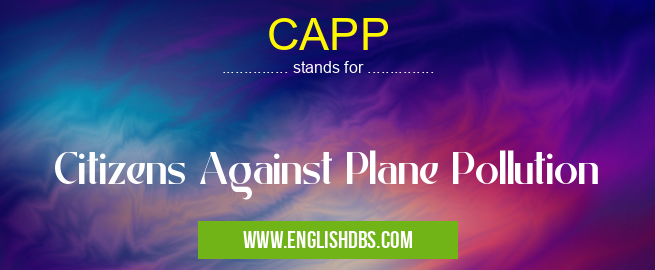What does CAPP mean in ENVIRONMENTAL
CAPP stands for Citizens Against Plane Pollution. It is a grassroots organization formed to address the concerns of residents impacted by aircraft noise and pollution. CAPP advocates for policies that reduce the impact of aircraft operations on communities.

CAPP meaning in Environmental in Governmental
CAPP mostly used in an acronym Environmental in Category Governmental that means Citizens Against Plane Pollution
Shorthand: CAPP,
Full Form: Citizens Against Plane Pollution
For more information of "Citizens Against Plane Pollution", see the section below.
CAPP's Mission
CAPP's mission is to:
- Reduce aircraft noise and pollution: Work with government agencies and airlines to implement measures that mitigate aircraft noise and emissions.
- Protect communities: Advocate for policies that protect residents from the adverse effects of aircraft operations.
- Educate the public: Raise awareness about the impacts of aircraft noise and pollution on communities.
CAPP's Activities
- Lobbying and advocacy: CAPP engages in lobbying and advocacy efforts to promote policies that reduce aircraft noise and pollution.
- Community organizing: CAPP works with local communities to organize residents and raise awareness about the issue of aircraft noise.
- Legal action: CAPP supports legal challenges to aircraft noise regulations and policies that do not adequately protect residents.
- Research and data collection: CAPP conducts research and collects data on the impacts of aircraft noise and pollution on communities.
Essential Questions and Answers on Citizens Against Plane Pollution in "GOVERNMENTAL»ENVIRONMENTAL"
What is CAPP's mission?
CAPP, or Citizens Against Plane Pollution, is a non-profit organization dedicated to advocating for policies that reduce aircraft noise and emissions. We aim to mitigate the environmental and health impacts of air pollution caused by aviation, particularly in communities near airports.
How do aircraft emissions affect the environment?
Aircraft engines emit various pollutants, including carbon dioxide, nitrogen oxides, and particulate matter. These pollutants contribute to air pollution, climate change, and respiratory issues. Additionally, aircraft noise can be disruptive and impact the quality of life for residents.
What are the solutions to reduce aircraft pollution?
Several solutions exist to reduce aircraft emissions and noise. These include:
- Technological advancements: Developing quieter aircraft, optimizing engine performance, and using alternative fuels.
- Operational measures: Implementing noise abatement procedures, rerouting flight paths, and reducing night flights.
- Policy changes: Implementing emission standards, imposing noise restrictions, and promoting sustainable aviation practices.
How can I get involved with CAPP?
You can support CAPP by:
- Joining our membership
- Donating to our cause
- Volunteering your time
- Spreading awareness about the impacts of aircraft pollution.
What are the benefits of reducing aircraft pollution?
Reducing aircraft pollution offers numerous benefits, such as:
- Improved air quality and public health
- Reduced noise levels and improved quality of life
- Mitigation of climate change impacts
- Promotion of sustainable aviation practices
Final Words: CAPP plays a crucial role in advocating for the interests of communities affected by aircraft noise and pollution. Their efforts help to raise awareness about this issue and push for policies that protect the health and well-being of residents. By engaging in lobbying, advocacy, community organizing, and research, CAPP works to create a more sustainable and livable environment for everyone.
CAPP also stands for: |
|
| All stands for CAPP |
